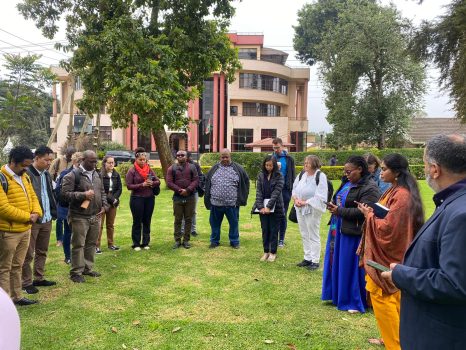From 19 to 30 August 2024, 27 church and youth leaders from 23 countries gathered in Limuru, Kenya, for the 7th edition of the Ecumenical School on Governance, Economics, and Management for an Economy of Life (GEM School). The participants included church leaders, pastors, theological students, and finance, economics, and ecological justice experts.
“The GEM School offers participants the opportunity to envision economics from a different perspective and through the lens of those who are marginalized,” said Philip Vinod Peacock, Executive Secretary of Justice and Witness. “Economic justice is a matter of faith, and it’s important for us to consider the spiritual and moral implications of our economic thinking,” he added.
In 2024, GEM School provided a special opportunity for participants to delve into the connections between theology and economics. They examined innovative economic systems and policies from ethical, theological, ecological, and feminist viewpoints, all with the goal of promoting a more fair and sustainable planet.
Throughout the ten-day program, attendees participated in Bible studies, theological reflections, and discussions on holistic economic policies. They also identified practical strategies for advocating an Economy of Life.
Building on these rich exchanges, participants developed various project proposals to promote an Economy of Life. These included the “E3: Engaging Ecumenically in Economics” project, which proposes a curriculum to teach a holistic approach to economics in seminaries; the “Manna Project,” focused on mobilizing resources for advocacy and community-based initiatives; and the “Put People and Earth Over Debt” campaign, a North-South initiative advocating for debt cancellation and climate finance in Ethiopia, Kenya, Canada, and Germany.
Rev. Chipasha Musaba, general secretary of the United Church in Zambia, reflected, “GEM School gave me the tools necessary to integrate theology and economics, enhancing my ability to advocate for an Economy of Life that prioritises justice and sustainability.”
Rev. Gelin Rosamour of the Methodist Church in the Caribbean and the Americas and Vice President of the Haiti Protestant Churches Federation noted, “GEM School is a bustling and energizing experience that transforms our views on advocacy for the planet. It empowers leaders by building their capacity for transformative action and fostering a theological foundation for economic justice.”
Rev. Sabrina Slater of the Presbyterian Church in the USA described the experience as “transformative and life-giving,” emphasising the importance of ongoing efforts to reshape social and economic structures to nurture life.
Convened by WCC, World Communion of Reformed Churches, Lutheran World Federation, World Methodist Council, and the Council for World Mission as part of the New International Financial and Economic Architecture (NIFEA) initiative, GEM School was hosted by St. Paul’s University and the National Council of Churches in Kenya.
The WCRC’s Economic justice programme is supported by the Otto Per Mille and the Council for World Mission.


